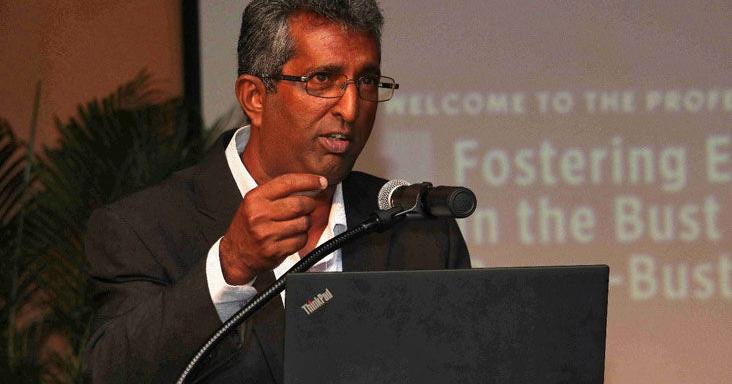By Joel Julien
Copyright trinidadexpress

TRINIDAD and Tobago is walking a narrowing fiscal and external accounts tightrope, economist Prof Roger Hosein has warned.
“While S&P’s affirmation of the ‘BBB-’ rating offers temporary relief, the negative outlook is a warning shot that the country’s buffers are thinning faster than official projections admit,” Hosein told Express Business.
“Reserve depletion is already running ahead of S&P’s assumptions, and the fiscal deficit remains hard-wired into the expenditure-revenue gap,” he said.
Hosein said without decisive reforms to broaden foreign exchange earnings, strengthen tax compliance, and expand sustainable revenue sources, the country risks a twin squeeze of external vulnerability and fiscal fragility.
“In the absence of structural change, today’s rating watch could easily become tomorrow’s downgrade,” Hosein said.
Hosein’s comments came in response to S&P’s revising Trinidad and Tobago’s outlook to negative from stable, warning that the country’s credit rating could be downgraded as early as next year.
The international ratings agency cited weakening Government finances, declining oil and gas output, and sluggish economic growth as key risks.
The warning comes as the United National Congress Government prepares to present its first national budget since winning the April 28 general election.
According to S&P yesterday, Trinidad and Tobago’s “fiscal and external buffers have eroded gradually over many years”, reflecting limited progress in boosting economic growth and strengthening fiscal management. As a result, the agency said the country’s outlook had to be revised.
“On September 25, S&P Global Ratings revised the outlook on the Republic of Trinidad and Tobago to negative from stable. At the same time, we affirmed our ratings on the country, including our ‘BBB-/A-3’ long- and short-term foreign and local currency sovereign credit ratings. The transfer and convertibility assessment remains ‘BBB’,” the rating action stated.
S&P said the negative outlook reflects the risk of a downgrade unless meaningful and timely steps are taken to strengthen public finances, ensure balanced economic growth, and maintain the country’s strong external position.
“The negative outlook has the potential to raise TT’s borrowing costs and heighten pressure on its foreign exchange reserves, already strained by weak energy receipts. Investor confidence in non-energy sectors can thus possibly decline and if they do, this could undermine trade diversification efforts,” Hosein said.
He said the downgrade risk reflects weak fiscal management, dependence on volatile energy revenues, and declining oil and gas output.
“That said, no one should be surprised,” Hosein said.
“The fundamentals have been signalling stress for years: a stagnant real GDP growth path, chronically low labour force participation, widening fiscal deficits, and rapidly falling reserves. These structural weaknesses are compounded by weak institutional reform, a quasi-fixed exchange rate and persistent US dollar shortages that undermine private sector competitiveness,” he said.
Hosein said the S&P report provided very useful data.
“The data shows that TT’s fiscal deficit remains structurally embedded, with fiscal expenses/GDP consistently outpacing fiscal revenues/GDP, a trend that has been ongoing almost uninterrupted for many years. Even with some cyclical recovery in revenues, S&P projects a wide gap in 2025 as expenditures rise to nearly 40% of GDP, while revenues stagnate around 33.5%,” Hosein said.
He warned that this imbalance signals a persistent reliance on deficit financing placing more pressure on public debt and narrowing fiscal space.
“This wide and persistent fiscal imbalance highlights that fiscal consolidation cannot be achieved by expenditure restraint alone; new and sustainable revenue streams are essential to prevent further erosion of buffers such as reserves and the Heritage and Stabilisation Fund,” he said.
“Note though it is still very necessary to reduce fiscal expenses, particularly wasteful spending in areas such as transfers and subsidies that the economy can no longer sustainably afford,” Hosein said.
‘More than just cost-cutting needed’
Hosein said the country’s fiscal challenge extends beyond trimming expenditure or simply “growing the economy” in aggregate terms.
“Without reforms to strengthen tax compliance and diversify the revenue base, the Government will remain locked in a cycle of high expenditure and weak revenues. The dismantling of the proposed Revenue Authority and the failure to implement the property tax have further eroded the capacity to mobilise stable and predictable revenues, undermining fiscal consolidation efforts,” Hosein said.
He said unless these gaps are addressed, expenditure pressures will continue to run ahead of income, leaving fiscal buffers depleted and debt dynamics increasingly fragile.
Hosein said was caught his attention in the S&P report was the treatment of “usable reserves.”
“Their projections appear overly optimistic when compared against both the Central Bank’s latest data and the historical depletion trend. As of August 2025, the CBTT reported net official reserves at roughly US$4.6 billion, yet S&P forecasts a year-end 2025 figure of US$4.54 billion, essentially assuming no meaningful drawdown over the final four months,” Hosein said.
He said that assumption is “unrealistic” given the seasonal surge in import demand during fourth quarter.
“A more credible trajectory would place reserves closer to US$4 billion by December 2025, and by the end of 2026 they could easily fall toward the US$3 billion mark. The disconnect likely stems from overly optimistic natural gas output forecasts fed into their forecasting model. When energy production assumptions are mis-specified, the entire external sustainability assessment becomes distorted, giving a false sense of resilience that the underlying numbers do not support,” Hosein said.
‘Policymakers must take note’
Hosein said the S&P projections of persistently negative net FDI/GDP ratios should also be noted by the policy makers.
“After 2023 the data shows sustained negative values for the net FDI/GDP ratio suggesting that foreign investors are withdrawing more capital than they are committing, eroding what should be a stable pillar of foreign exchange supply,” Hosein said.
“This trend likely reflects not just global headwinds but also domestic bottlenecks, bureaucratic delays, weak ease of doing business rankings, and policy uncertainty in the context of diminished energy revenues. To reverse this negative trajectory, policymakers must tackle crime decisively, improve the investment climate through timely capital injections and infrastructure upgrades, pursue a more competitive real effective exchange rate, and integrate Venezuelan migrants more strategically into the labour market to enhance productivity and foreign exchange generation,” he said.
Hosein said this country’s import cover fell from nearly ten months of import cover in 2019/2020 to a projected 4.8 months by 2027.
He said this signals a tightening squeeze on the availability of foreign exchange.
“This would be a serious blow for small businesses, which already face rationing and long delays in accessing US dollars through the banking system and this trend means conditions will worsen. Specifically import dependent firms will further struggle to secure raw materials, spare parts, and inventory and if they can survive, they would be pushed in some cases into the more expensive parallel market,” Hosein said.
“In this regard policy makers will have to create smoother pathways for more creative use of domestic resources. Small enterprises will need to substitute imported inputs where possible, deepen linkages with local suppliers, and pivot toward goods and services that can be produced for the domestic and regional market. Strategies such as clustering may emerge as a dominant option,” he said.
Hosein said more than all of this, the persistence of a negative net FDI/GDP ratio after 2023, as outlined in the S&P report, will weigh heavily on the country’s growth trajectory and must be reversed.
“The e TecK parks have a particularly important role to play in this effort. These industrial parks should be deliberately targeted at export-oriented firms and import-competing firms, ensuring that only businesses which are net foreign exchange earners or competitive import substitutors benefit from the subsidised industrial space provided. In this way, the parks can function as a catalyst for reversing FDI outflows, strengthening external balances, and supporting sustainable growth,” he said.



